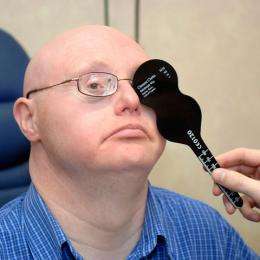Adults with learning disabilities at greater risk of sight problems

Adults with learning disabilities are ten times more likely to be blind or have impaired vision according to researchers from Lancaster University.
Professor Eric Emerson and Dr Janet Robertson of the Centre for Disability Research at Lancaster University have carried out the first ever overall estimate of the numbers of people with learning disabilities and sight difficulties in the UK on behalf of the RNIB and the charity SeeAbility.
They found that there are over a million adults in the UK with learning difficulties and six out of ten of these need glasses.
They also found that:
An estimated 96,500 adults with learning disabilities are blind or partially sighted. This means that nearly one in 10 adults with learning disabilities is blind or partially sighted.
An estimated 23,000 children and young people with learning disabilities in the UK are blind or partially sighted.
An estimated 579,000 adults with learning disabilities have refractive errors including long and short-sightedness.
The report added that people with severe or profound learning disabilities are most likely to have sight problems.
The authors commented that: “People with learning disabilities may not know they have a sight problem and may not be able to tell people. Many people think the person with a learning disability they know can see perfectly well. People with learning disabilities need to have a sight test every two years, sometimes more often. Regular sight tests and wearing glasses helps people stay healthy and get the most from life. “
The Centre for Disability Research is run jointly by the Faculty of Arts and Social Sciences and the Faculty of Health and Medicine.















